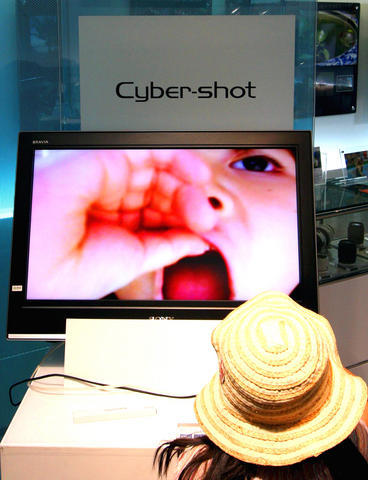Sony Corp -- the world's second-biggest consumer electronics maker -- reported that first-quarter profit doubled as sales of Cyber-shot cameras and Bravia televisions were boosted by a weaker yen.
Net income rose to ?66.5 billion (US$552 million), or ?63.14 per share, in the first quarter ended June 30, from ?32.3 billion, or ?30.75, a year earlier, the Tokyo-based company said in a statement yesterday.
Sales increased 13 percent to ?1.98 trillion from ?1.74 trillion.

PHOTO: EPA
A decline in the yen boosted overseas profit from Cyber-shot and Handycam cameras, countering a wider loss at the PlayStation games unit.
Chief executive officer Howard Stringer plans to raise Sony's operating profit margin to 5 percent this fiscal year, catching up with larger rival Matsushita Electric Industrial Co's 5.05 percent.
Shares of Sony rose 1.1 percent to ?6,350 in Tokyo yesterday. The results were announced after the market closed.
The stock has gained 25 percent this year, compared with a 2.8 percent advance in the Nikkei 225 Stock Average.
Shares of Nintendo Co, meanwhile, rose to a record, bringing the company's market value to US$73 billion, after the maker of the top-selling Wii console raised its earnings forecast on demand for the console and game titles.
Nintendo added 8.8 percent, or the exchange-imposed limit of ?5,000, to ?61,800 at the 3pm close of the Osaka Securities Exchange, valuing the Kyoto-based company at ?8.76 trillion.
That exceeds Sony's value of ?6.37 trillion by about 38 percent.
The company, whose Wii console outsells Sony's PlayStation 3, yesterday raised its net income forecast by 41 percent to ?245 billion for this fiscal year.
More game titles and a cheaper price than Sony's PlayStation 3 may help Nintendo reach an increased sales target of 16.5 million Wii players this year.
Tokyo-based Sony forecasts shipments of 11 million PlayStation 3s.
"With the popularity of the Wii and the launch of a new Pokemon game title in Europe on July 27, we expect sales to remain strong for the rest of the year," Atsuko Kaneko, a games analyst at UBS Securities Japan Ltd, wrote in a report dated yesterday.
She kept her "buy" rating on the stock, and raised the 12-month share price target to ?63,000 from ?47,000.

MORE VISITORS: The Tourism Administration said that it is seeing positive prospects in its efforts to expand the tourism market in North America and Europe Taiwan has been ranked as the cheapest place in the world to travel to this year, based on a list recommended by NerdWallet. The San Francisco-based personal finance company said that Taiwan topped the list of 16 nations it chose for budget travelers because US tourists do not need visas and travelers can easily have a good meal for less than US$10. A bus ride in Taipei costs just under US$0.50, while subway rides start at US$0.60, the firm said, adding that public transportation in Taiwan is easy to navigate. The firm also called Taiwan a “food lover’s paradise,” citing inexpensive breakfast stalls

TRADE: A mandatory declaration of origin for manufactured goods bound for the US is to take effect on May 7 to block China from exploiting Taiwan’s trade channels All products manufactured in Taiwan and exported to the US must include a signed declaration of origin starting on May 7, the Bureau of Foreign Trade announced yesterday. US President Donald Trump on April 2 imposed a 32 percent tariff on imports from Taiwan, but one week later announced a 90-day pause on its implementation. However, a universal 10 percent tariff was immediately applied to most imports from around the world. On April 12, the Trump administration further exempted computers, smartphones and semiconductors from the new tariffs. In response, President William Lai’s (賴清德) administration has introduced a series of countermeasures to support affected

CROSS-STRAIT: The vast majority of Taiwanese support maintaining the ‘status quo,’ while concern is rising about Beijing’s influence operations More than eight out of 10 Taiwanese reject Beijing’s “one country, two systems” framework for cross-strait relations, according to a survey released by the Mainland Affairs Council (MAC) on Thursday. The MAC’s latest quarterly survey found that 84.4 percent of respondents opposed Beijing’s “one country, two systems” formula for handling cross-strait relations — a figure consistent with past polling. Over the past three years, opposition to the framework has remained high, ranging from a low of 83.6 percent in April 2023 to a peak of 89.6 percent in April last year. In the most recent poll, 82.5 percent also rejected China’s

PLUGGING HOLES: The amendments would bring the legislation in line with systems found in other countries such as Japan and the US, Legislator Chen Kuan-ting said Democratic Progressive Party (DPP) Legislator Chen Kuan-ting (陳冠廷) has proposed amending national security legislation amid a spate of espionage cases. Potential gaps in security vetting procedures for personnel with access to sensitive information prompted him to propose the amendments, which would introduce changes to Article 14 of the Classified National Security Information Protection Act (國家機密保護法), Chen said yesterday. The proposal, which aims to enhance interagency vetting procedures and reduce the risk of classified information leaks, would establish a comprehensive security clearance system in Taiwan, he said. The amendment would require character and loyalty checks for civil servants and intelligence personnel prior to